A decade of hate: How anti-LGBTQ+ rhetoric has shaped legislation in Pierre
Editor’s note: This is the fifth article in a series of six exploring South Dakota’s last decade of anti-LGBTQ+ legislation, “A decade of hate.” Stay with the Argus Leader in the coming days for the sixth article in this series.
For 10 consecutive legislative sessions in Pierre, a coalition of lawmakers have brought bills targeting the LGBTQ+ and Two Spirit community's ability to play sports, to access healthcare, to adopt children and to use the facilities of their choice, among other topics.
Even when some of these bills have failed, the memory of negative arguments, lies and misinformation spread about the community lingers in the minds of LGBTQ+ and Two Spirit South Dakotans, their allies and lobbyists in Pierre.
Now that the latest of these laws, HB 1080, went into effect July 1 and outlaws gender-affirming care for minors in South Dakota, the Argus Leader reexamined some of the language lawmakers and lobbyists have used to support this legislation targeting the community and how it’s affected LGBTQ+ and Two Spirit South Dakotans.
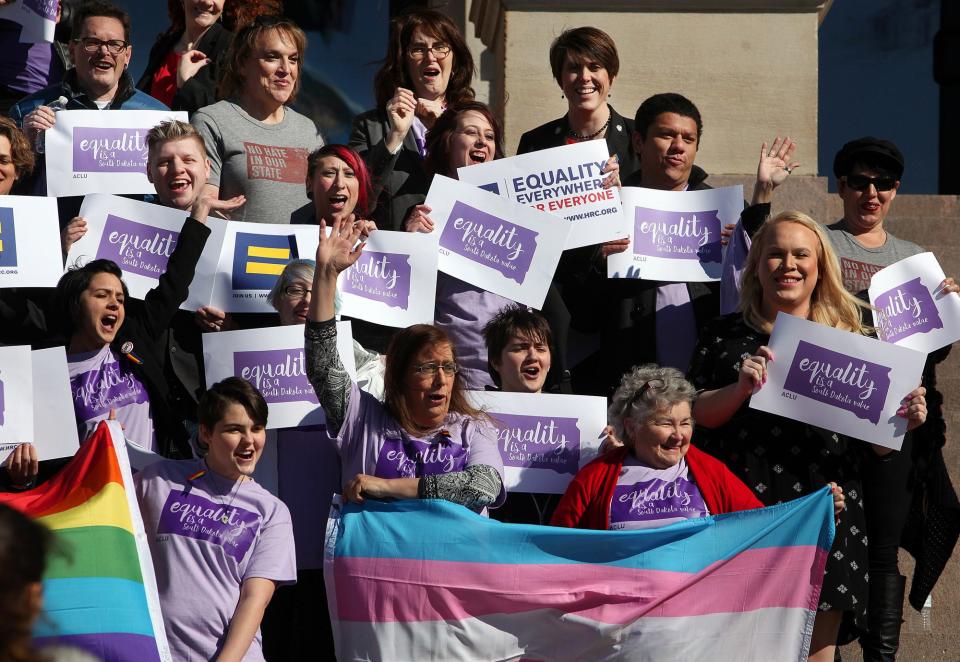
Here’s what lawmakers have said about LGBTQ+ people over the years
In 2016, lawmakers like Rep. Steve Haugaard (R-Sioux Falls) called being trans a “choice of lifestyle,” and Sen. David Omdahl (R-Sioux Falls) argued trans people were “twisted” and needed psychological help.
"I'm sorry if you're so twisted you don't even know who you are," he said at the time, adding doctors are “treating the wrong part of the anatomy. They ought to be treating it up here,” he said, pointing to his head.
At a legislative coffee in Sioux Falls in 2016, Rep. Isaac Latterell (R-Tea) explained his position on a bathroom bill, HB 1008, by saying, “We all need the love and forgiveness of Jesus Christ, no matter our situation,” which received a loud booing from the hundreds of attendees.
It's unclear if either Haugaard, Omdahl or Latterell still think that way. They did not respond to requests for comment from the Argus Leader by publication time.
During discussions about sports bill SB 46 in 2022, Gov. Kristi Noem’s former chief of staff Mark Miller pointed to other states that allow trans people to play on the sports teams that match their gender and said, “it's sort of like terrorism,” explaining that you see it elsewhere and don't want it to get here. Miller left the Governor’s Office in June.
More: Noem's chief of staff says participation in sports by transgender athletes 'sort of like terrorism'
Some anti-trans bills and the press releases and speeches made about them by their supporters don’t even refer to transgender people by proper terms, rather referring to them as “biological boys” or “biological females,” for example, which isn’t a main focus of how trans people identify. They don’t identify with the sex they were assigned at birth, but with their lived gender.
This kind of language may be an intentional choice. In an email chain between Rep. Fred Deutsch (R-Florence) and other anti-trans lawmakers across the U.S. leaked by Mother Jones, Richard Mast of Liberty Counsel advised the group to avoid saying the words transgender, cisgender or nonbinary.
“Using them surrenders the language,” Mast wrote. “If the other side’s language frames the debate, we lose.”
Anti-trans rhetoric is a ‘fear-mongering tactic’
This rhetoric lingers in the minds of people like Elliott Morehead, a 17-year-old Lincoln High School student, director of South Dakota Youth Activism and a testifier against HB 1080 this past legislative session.
Morehead said when he testified against HB 1080, he was “ticked off” by the supporters of the bill who used limited studies and experiences from a small subset of former trans people who stopped their medical transition to justify the bill and their decisions.
“Using people who detransitioned and went through a lot of medical trauma, and using those people and their stories as a way to carry out your agenda (is) just sick,” Morehead said, explaining he has sympathy for them, but they represent a small population.
More: Effort to limit gender-affirming care for trans youth in South Dakota moves forward
The World Professional Association for Transgender Health said evidence of trans people later regretting their gender-affirming care is scant, as low as 1% on average, the Associated Press reports. Trans patients are told about that possibility during psychological counseling.
People may stop gender-affirming care for a variety of reasons, including that they lack the social support or resources to continue care, that they don’t wish to complete a “full transition” to a binary gender, or they may wish to have children of their own, according to the Trans Journalists Association.
Morehead said he was also disturbed by the explicit discussions on surgery and the use of words like “mutilation” that he said could scare people and were used as a “fear-mongering tactic.”
Libby Skarin, campaigns director for the ACLU of South Dakota, North Dakota and Wyoming, said many of the arguments legislators use in favor of anti-LGBTQ+ legislation echo arguments used to justify anti-gay laws and homophobia in the 1980s and 1990s at the height of the HIV/AIDS epidemic.
Candi Brings Plenty, who is Oglala Lakota and Two Spirit, is a former Indigenous justice organizer for the ACLU of South Dakota and lobbied against anti-LGBTQ+ and anti-Two Spirit legislation from a narrative of visibility and awareness.
With anti-trans legislation in particular, Brings Plenty said it was hard to see how much it impacted the youth who testified or who would be affected by the bills.
“It is the youth who are mostly out and in a place of acceptance amongst their peers, and it’s the adults and decision-makers who are the ones struggling most,” they said.
More: 'They all dance:' Indigenous LGBTQ+ people hold Inaugural Two Spirit Wacipi during Pride
Anti-trans rhetoric only elevates the climate that has caused the missing and murdered Indigenous people (MMIP) epidemic in South Dakota, Brings Plenty said.
Anti-MMIP activists like Brings Plenty point to centuries of colonial trauma and prejudicial or ineffective government policies that entrenched within Indigenous communities higher rates of poverty, substance and domestic abuse, and other issues that contribute to Indigenous people having a lower life expectancy rate than other groups.
“That’s made it extremely dangerous, tenfold, hundredfold, for women and Two Spirits,” they said.
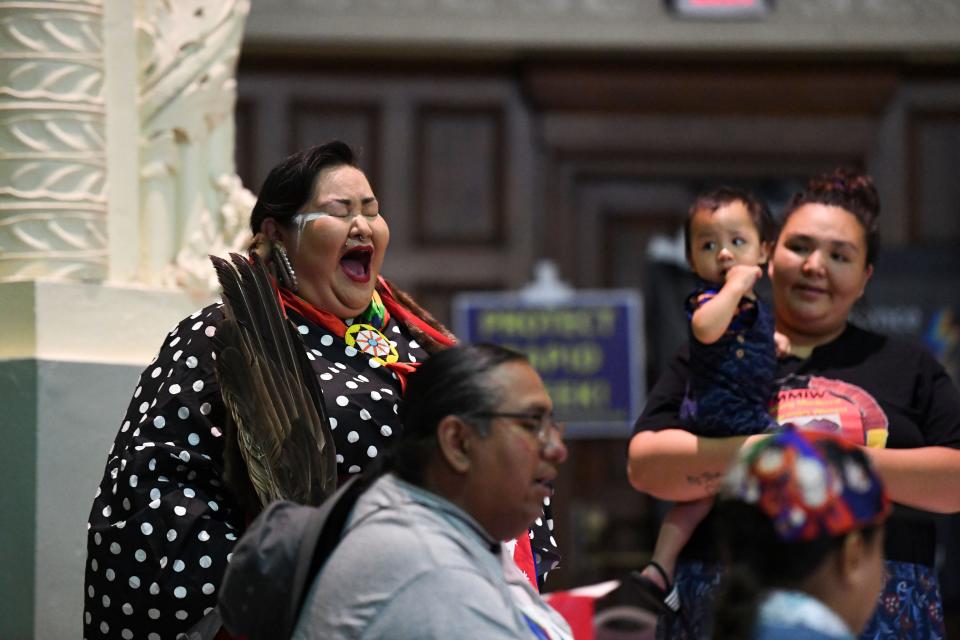
Do LGBTQ+ people feel respected in Pierre?
Stephanie Marty, the board treasurer of the Transformation Project and the founder of its Marty’s Closet project, said her transition was painful. She was of the mindset that no other person should have to go through what she went through.
“Going to Pierre under those circumstances was really an eye-opener in that the decisions were already made before we even opened our mouths,” Marty said of her experience testifying against HB 1005, a bathroom bill, in 2022, which failed in a Senate committee.
More: 'We are your neighbors': How does it feel to be transgender or nonbinary in South Dakota?
Barriers like time limits for testimony and the early morning committee schedule make it difficult for people to travel to Pierre and speak up, she said. She felt there was nothing she or others could do to change the outcome of the vote.
Marty said she feels there isn’t enough respect among lawmakers for the medical groups, counselors and trans kids that testify against the legislation that harms them.
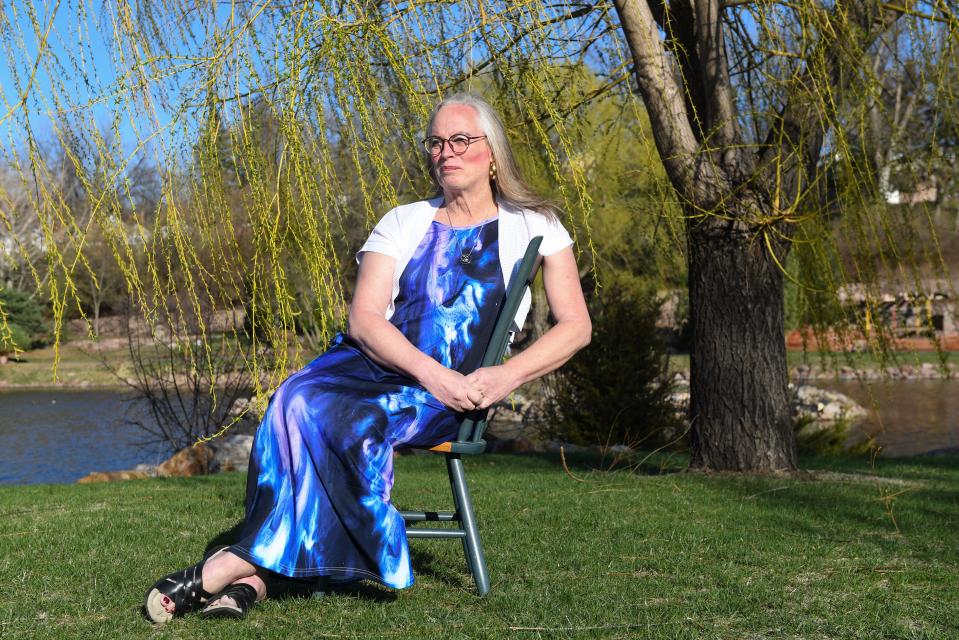
When the ACLU works with trans youth and helps them prepare to testify against bills that affect them, Skarin has said she’s had to tell youth to prepare to get rude questions, to go face-to-face with legislators who won’t even look them in the eye, or to hear things that are horrifying from adults who doubt their identity.
For the legislators that are allies or members of the LGBTQ+ community like Rep. Kameron Nelson (D-Sioux Falls), the first openly gay man elected to the South Dakota Legislature, there is a level of decorum and respect amongst other legislators, but sometimes Nelson said he feels like he can’t breathe in the Capitol.
“There’s a few bad actors who can barely sit next to me, let alone acknowledge my existence as a queer person,” Nelson said. “It is hard walking into the Capitol some days.”
After Rep. Brandei Schaefbauer (R-Aberdeen) quoted Rev. Dr. Martin Luther King Jr. in her defense of HB 1080, Nelson said those comments taken out of context didn’t sit well with him, and called the comments about King’s quotes “reprehensible.” He then delivered a speech on the House floor unlike any ever heard before in the historic halls.
“I’m here, I’m queer, and I’m not leaving Pierre,” he said.
Some of his colleagues could be heard laughing after he said this.
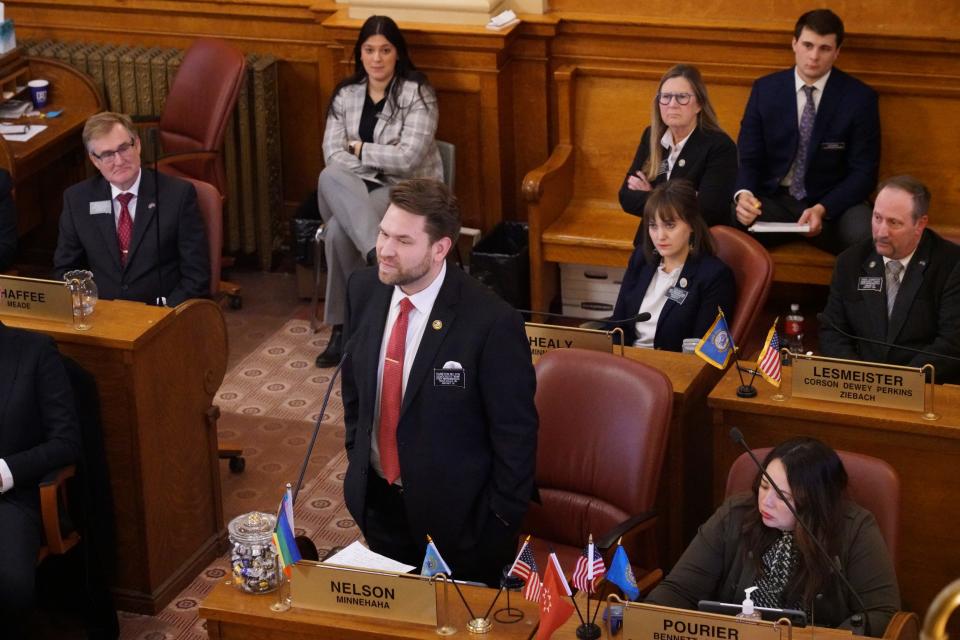
House Speaker Hugh Bartels (R-Watertown) called Nelson and the House Democratic caucus into a meeting in his office the following day because some Republicans weren’t happy with Nelson’s statements, Nelson said.
Bartels said the meeting was about Nelson’s decorum, and explained that on the House floor, lawmakers can’t aim personal comments at each other or even refer to each other by name.
Nelson was told by Bartels that he could be gaveled down as other lawmakers had in the past. Nelson said his caucus had his back and were supportive of him, and they agreed to be more diligent in their responses moving forward for the rest of the legislative session.
A similar case occurred in Montana this April when first-term Democratic Rep. Zooey Zephyr was prevented from speaking on the House floor when she refused to apologize for telling her fellow lawmakers that if they supported a gender-affirming care ban similar to HB 1080, they would have blood on their hands.
A trend of LGBTQ+ brain drain
Sen. Reynold Nesiba (D-Sioux Falls) said he believes that brain drain — a trend of highly-educated people leaving the state after they graduate — extends to the LGBTQ+ community, too, who might leave South Dakota for states that are more accepting of their identity or that have better policies protecting them and their rights.
“We need to do better at making diverse college graduates feel like they want to stay here,” Nesiba said. “Community members and allies continue to leave because of the unnecessary political divisiveness and ongoing attacks on LGBTQ+ people.”
Nelson lived in Minnesota for a while before moving back to his home state to serve in the Legislature and said millennials who continue to leave South Dakota in droves fear returning, but some of them do want to move back.
“I made that decision and I’m happy about that,” he said. “I love South Dakota, but when we continue to see extreme legislation harming individuals under the pretense of helping them and misinforming the general public about who we are as their neighbors, friends and colleagues, that’s really concerning for many reasons.”
Brings Plenty said she knows people who moved out-of-state over years not just because of the recent medical ban, but because South Dakota has been labeled a homophobic, anti-trans state for years. At the same time, they know of people who don’t have the option, opportunity or privilege to move.
Thomas Lewis, a prominent voice in the 2016 fight against HB 1008, said the continual attacks on trans kids don’t inspire people to want to stay in-state and improve it. He’s stayed in South Dakota almost all this time, but could consider moving to another state for his and his son’s safety if trans people are “outright outlawed somehow.”
“Until then, I’m fighting for my spot,” he said. “I was born here. I grew up here. I’m not any less deserving of the chance to succeed here.”
Other people are considering leaving South Dakota because they can’t get the gender-affirming medical care they need anymore after HB 1080 passed.
Jack Fonder, community health worker for the Transformation Project, said he considered leaving South Dakota with his wife and kids before he joined TP because of the policies in South Dakota.
“I was trying to find ways to not live here,” he said. “Now, I do feel maybe more of a sense of purpose to be here, and to help the people that need the help.”
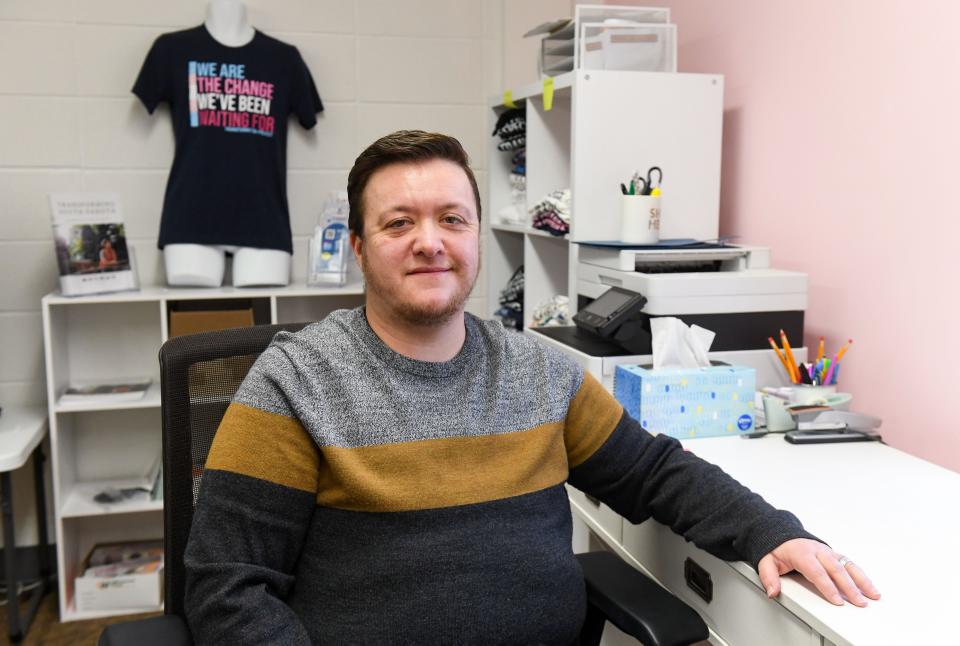
The Transformation Project and the state of South Dakota are currently at odds in a lawsuit after the Department of Health terminated the contract funding for Fonder’s position. TP has fundraised to keep his job despite the lack of state funding.
More: After loss of DOH assistance, Jack Fonder still plans to advocate for LGBTQ+ South Dakotans
How lobbyists work together on these issues
Dozens of lobbyists have joined together throughout the years to lobby for LGBTQ+ rights in the Capitol, representing everything from medical associations, pride groups, education groups and religious groups.
Sometimes in a matter of minutes, they have to get together and decide how they’ll work to present their argument before a committee of legislators who will vote on any given bill.
Roger Tellinghuisen, who has at times represented the Human Rights Campaign and the South Dakota Trial Lawyers Association as a lobbyist, said lobbyists have to be light on their feet and nimble as they often don’t know what will come up until it “gets dropped.”
When that happens, he goes back to his clients and they put their heads together on how to best respond to it.
Susan Williams, director of the Transformation Project, said she and Fonder are in a constant state of stress because of the nature of their jobs fighting for the trans community.
“You cannot let up for a second,” Williams said. “We are always having to be on the defense, which is really frustrating, because it would be nice to be on the offense once in a while. Right now we’re fighting for the lives of trans people, and that’s what keeps us going every day.”
With the recent passage of HB 1080, lobbyists had to counter supporters’ argument that the bill was protecting children’s welfare, Lawrence Novotny, who has lobbied for Equality South Dakota and the Brookings Human Rights Commission, said.
“It really should be the parents, guardians and medical professionals making the best decisions for the kids, and not legislators in Pierre,” Novotny said. “It’s a tougher battle when for these past (10) years, sometimes we realize we might lose. We have to keep going at it.”
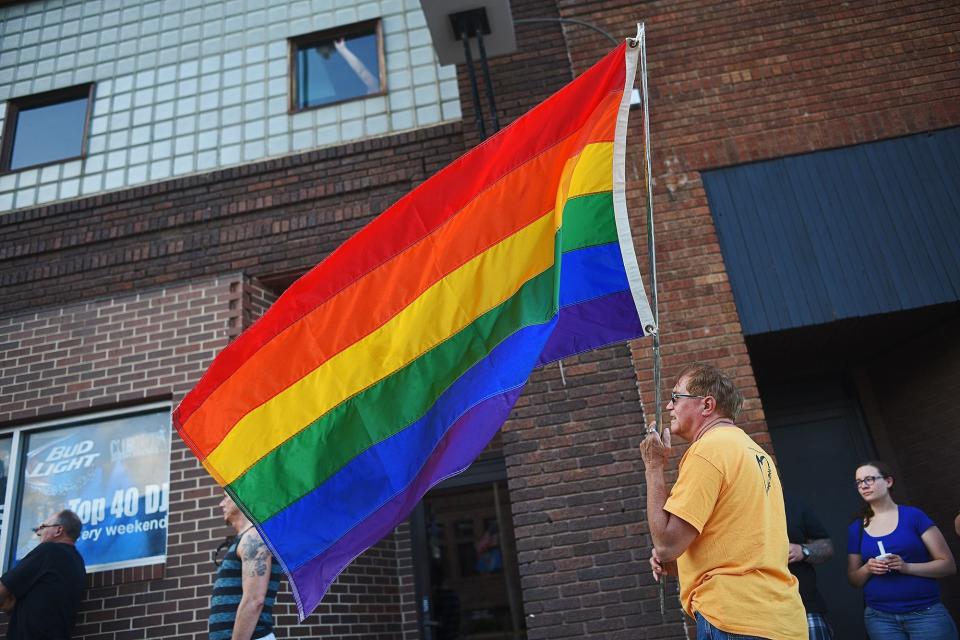
It’s long been the position of lobbyists with education groups like the large school group, South Dakota Education Association, School Administrators of South Dakota and Associated School Boards of South Dakota that policies regarding transgender students belong at the local school district level.
“We shouldn’t be discriminating against any child,” Dianna Miller, lobbyist for the large school group, said. “The role of the public school is to protect the safety and security of kids, and educate all children. We’re here for all kids, and all kids need to be treated with dignity and respect.”
With sports bills, Miller said schools had long respected the SDHSAA as a body that regulated activities in the state and adopted their policy, which was well-researched and well-vetted.
Miller questioned if any of the people who introduce bills or education policies affecting LGBTQ+ students have visited their local school districts since local schools welcome visitors.
Sandra Waltman, director of government relations and communications for SDEA, said much of SDEA’s work has been about helping legislators understand what bills like these can mean for students in the LGBTQ+ community.
“For us, it’s about making sure that our schools are a safe and welcoming place, and that’s why we have lent our voice,” Waltman said. “These decisions about how schools create those safe spaces should be left up to school boards and parents, not the Legislature.”
Tellinghuisen said as a lobbyist working on LGBTQ+ issues, it can be frustrating because there are other pressing issues in this state “than what the Legislature finds itself preoccupied with, than transgender children.”
He said more legislators should focus on the expertise and experience of people in the state than those who come from out-of-state.
Why representation matters in Pierre
Williams said the makeup of the Legislature needs to change drastically for more positive LGBTQ+ legislation to have a chance. That’s why the Transformation Project Advocacy Network and LGBTQ+ Victory Institute are working to increase short and long-term LGBTQ+ political participation.
“The world is a diverse place, the state is diverse, so we need to have that same representation for people that are running the state,” Williams said.
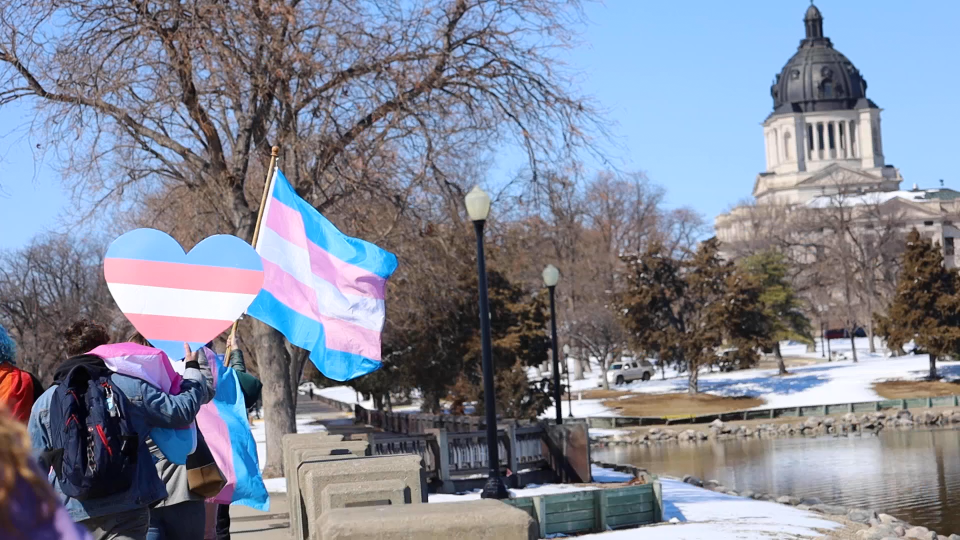
As it stands, the groups say only three out LGBTQ+ elected officials serve on the local level throughout the state: Michael Birkeland, a gay man on the Rapid City School Board; Alicia Mousseau, a lesbian and vice president of the Oglala Sioux Tribe; Nick Wendell, a gay man on the Brookings City Council and deputy mayor, who also serves as the executive director of the Board of Technical Education.
Nelson serves at the state level, and said that title weighs heavy on him.
“It weighs heavy on me as a person who is part of the queer community, and then as a legislator realizing my colleagues chose to ignore my perspective when I stand up and share that this is harmful legislation,” he said.
Toni Diamond, a veteran of the U.S. Marines, was the first openly trans woman to ever run for a state office in 2020 when she ran for a House seat representing District 32 in Rapid City and lost. She said she wants to run again in 2024.
“It was a scary time for me to consider running,” she said. “I didn’t know how it was going to go. I was fearful.”
Diamond said she discovered more people are open-minded than they appear to be in South Dakota and in Rapid City, and said that her experience running as an openly trans person was more favorable than negative.
Diamond wants to run again because she wants to continue to fight for the state’s LGBTQ+ community. She also wants to focus on platforms like environmental controls, water rights, limiting mining, protecting natural resources and advocating for teachers.
She said she agrees that there needs to be more representation of LGBTQ+ and Two Spirit people, as well as more Indigenous people and people of color, so that there’s fair and equitable representation across the board.
“Get to know me as a person,” Diamond said. “If you look at the labels and titles, you already have a preconceived notion (of me).”
This article originally appeared on Sioux Falls Argus Leader: Anti-LGBTQ+ rhetoric's historic home in Pierre, South Dakota

